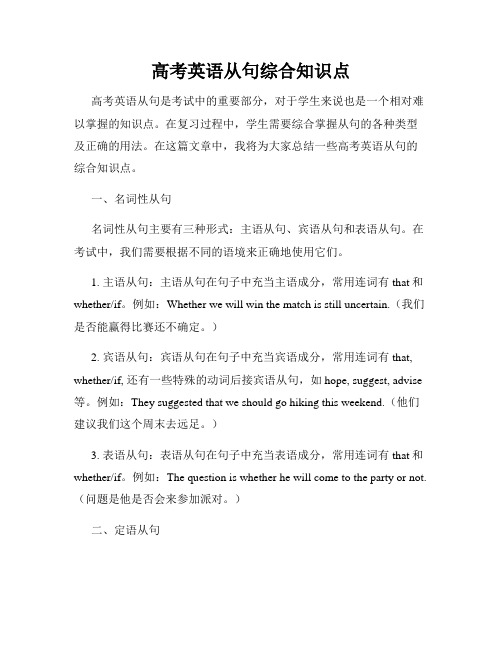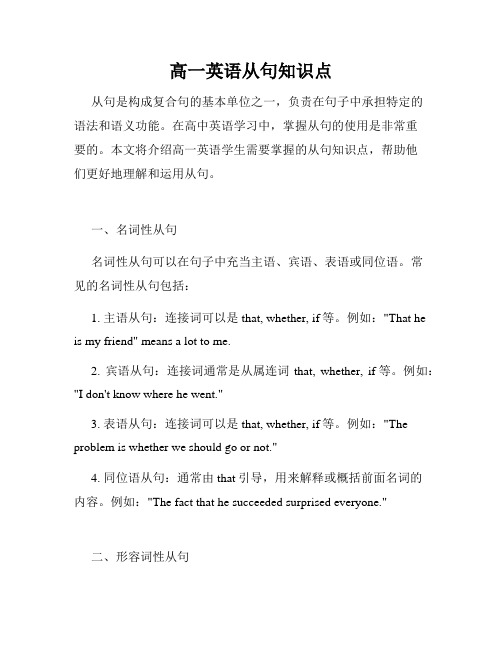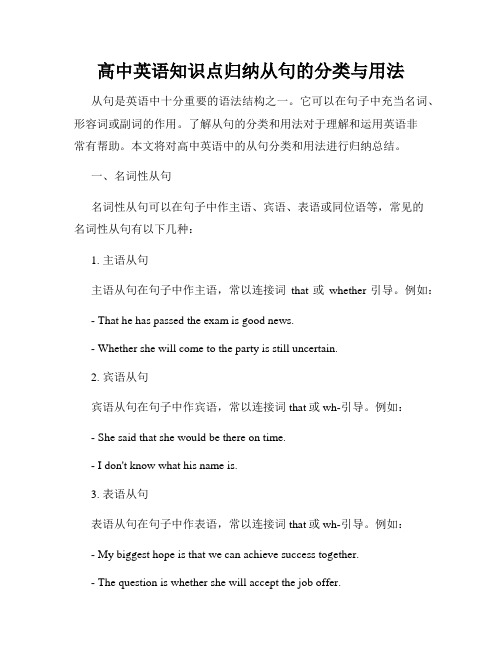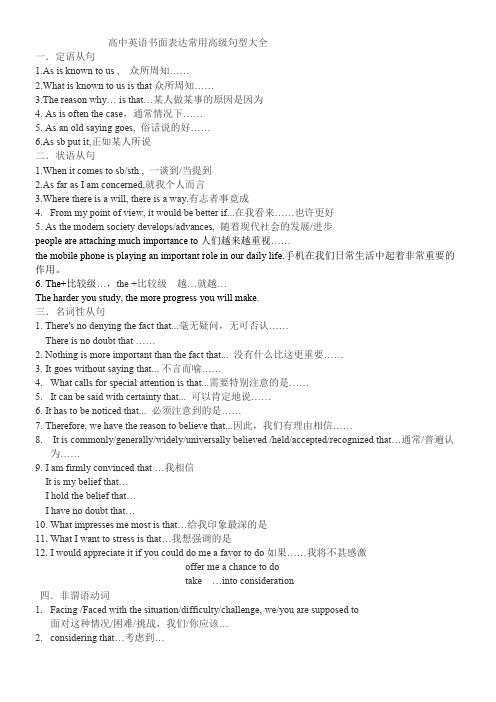高中英语从句大全汇总!
高考英语从句综合知识点

高考英语从句综合知识点高考英语从句是考试中的重要部分,对于学生来说也是一个相对难以掌握的知识点。
在复习过程中,学生需要综合掌握从句的各种类型及正确的用法。
在这篇文章中,我将为大家总结一些高考英语从句的综合知识点。
一、名词性从句名词性从句主要有三种形式:主语从句、宾语从句和表语从句。
在考试中,我们需要根据不同的语境来正确地使用它们。
1. 主语从句:主语从句在句子中充当主语成分,常用连词有that和whether/if。
例如:Whether we will win the match is still uncertain.(我们是否能赢得比赛还不确定。
)2. 宾语从句:宾语从句在句子中充当宾语成分,常用连词有that, whether/if, 还有一些特殊的动词后接宾语从句,如hope, suggest, advise 等。
例如:They suggested that we should go hiking this weekend.(他们建议我们这个周末去远足。
)3. 表语从句:表语从句在句子中充当表语成分,常用连词有that和whether/if。
例如:The question is whether he will come to the party or not.(问题是他是否会来参加派对。
)二、定语从句定语从句用来修饰名词或代词,在句中充当定语成分。
在日常口语和写作中,定语从句的使用频率相对较高,因此熟练掌握其用法对于高考很有必要。
定语从句的关系词有:that, which, who, whom, whose等。
我们需要根据先行词在定语从句中的作用来选择合适的关系词。
1. 关系代词that和which的区别:that用于限定性定语从句中,不可以省略。
而which则用于非限定性定语从句中,用于修饰整句的内容,可以省略。
例如:The book that I borrowed from the library is very interesting.(我从图书馆借来的那本书非常有趣。
高中英语知识点归纳主语从句与宾语从句

高中英语知识点归纳主语从句与宾语从句主语从句是指在复合句中作主语的从句,而宾语从句则是在复合句中充当宾语的从句。
它们是高中英语中比较重要的知识点,下面将对主语从句与宾语从句进行归纳。
1.主语从句(Subject Clauses)主语从句在句子中充当主语,常用连词有:that, whether, who, whom, whose, which等。
例子:- That he is a good student is known to all.(大家都知道他是一个好学生)- Whether he will come is uncertain.(他是否会来是不确定的)- Who will win the game remains unknown.(谁将会赢得比赛仍是未知的)在主语从句中,应注意以下几点:- 当主语从句要表达的是一种客观事实时,常用that作为引导词。
如:That he is a good student is known to all.- 当主语从句表达的是一种疑问或选择时,常用whether作为引导词。
如:Whether he will come is uncertain.用which做引导词。
如:Who will win the game remains unknown.- 在口语中,常常省略引导词that,直接使用主语从句作为主语。
如:It is important to learn English well.2.宾语从句(Object Clauses)宾语从句在复合句中充当宾语的角色,常用连词有:that, whether, if, what, who, whom, whose, which等。
例子:- She asked me where I was going.(她问我去哪儿)- He doesn't know if/whether he can pass the exam.(他不知道自己是否能通过考试)- Can you tell me what time it is now?(你能告诉我现在几点了吗)在宾语从句中,应注意以下几点:- 宾语从句通常放在及物动词和介词后面。
高一英语从句知识点

高一英语从句知识点从句是构成复合句的基本单位之一,负责在句子中承担特定的语法和语义功能。
在高中英语学习中,掌握从句的使用是非常重要的。
本文将介绍高一英语学生需要掌握的从句知识点,帮助他们更好地理解和运用从句。
一、名词性从句名词性从句可以在句子中充当主语、宾语、表语或同位语。
常见的名词性从句包括:1. 主语从句:连接词可以是that, whether, if等。
例如:"That he is my friend" means a lot to me.2. 宾语从句:连接词通常是从属连词that, whether, if等。
例如:"I don't know where he went."3. 表语从句:连接词可以是that, whether, if等。
例如:"The problem is whether we should go or not."4. 同位语从句:通常由that引导,用来解释或概括前面名词的内容。
例如:"The fact that he succeeded surprised everyone."二、形容词性从句形容词性从句用来修饰名词或代词,常用连接词有that, who, whom, whose, which, when, where, why等。
例如:"I love the book that you recommended."三、副词性从句副词性从句用来修饰动词、形容词或副词。
常见的副词性从句有:1. 时间状语从句:连接词有when, while, before, after, since等。
例如:"He called me when he arrived."2. 地点状语从句:连接词有where, wherever等。
例如:"I will go wherever you go."3. 原因状语从句:连接词有because, since, as等。
高中英语知识点归纳从句的分类与用法

高中英语知识点归纳从句的分类与用法从句是英语中十分重要的语法结构之一。
它可以在句子中充当名词、形容词或副词的作用。
了解从句的分类和用法对于理解和运用英语非常有帮助。
本文将对高中英语中的从句分类和用法进行归纳总结。
一、名词性从句名词性从句可以在句子中作主语、宾语、表语或同位语等,常见的名词性从句有以下几种:1. 主语从句主语从句在句子中作主语,常以连接词that或whether引导。
例如:- That he has passed the exam is good news.- Whether she will come to the party is still uncertain.2. 宾语从句宾语从句在句子中作宾语,常以连接词that或wh-引导。
例如:- She said that she would be there on time.- I don't know what his name is.3. 表语从句表语从句在句子中作表语,常以连接词that或wh-引导。
例如:- My biggest hope is that we can achieve success together.- The question is whether she will accept the job offer.同位语从句用来对某个名词或代词进行解释或说明,常以连接词that引导。
例如:- The fact that he broke his promise disappointed me.- Her announcement that she was going to retire surprised everyone.二、形容词从句形容词从句用来修饰名词或代词,常以连接词that, which, who, whom, whose, when, where, why等引导。
例如:- The book that I borrowed from the library is very interesting.- I know a girl whose father is a famous actor.三、副词从句副词从句用来修饰动词、形容词或副词,常以连接词that, if, whether, because, although, when, where, how等引导。
高中英语语法归纳总结从句

高中英语语法归纳总结从句从句是英语语法中的一个重要部分。
它能够在句子中充当名词、形容词或副词的作用,增强句子的表达力和多样性。
本文将对高中英语语法中的从句进行归纳总结,帮助学生们更好地理解和应用从句。
一、名词性从句名词性从句可以在句中担任主语、宾语、表语和同位语的角色。
常见的名词性从句有以下几种类型。
1. 主语从句主语从句在句中充当主语的角色,常以“that”或“whether/if”引导。
例如:“What you said doesn't make sense.”(你说的话毫无意义。
)主语从句的引导词可以省略,直接使用动词来引导,例如:“To forgive is to forget.”(宽恕就是忘记。
)2. 宾语从句宾语从句在句中作为动词的宾语,常以“that”或连接词引导,例如:“He said that he would come.”(他说他会来。
)宾语从句的引导词可以根据从句的内容来选择,如“whether/if”、“when”、“where”等。
3. 表语从句表语从句在句中充当表语的角色,常以“that”引导,例如:“The fact is that he is ly ing.”(事实是他在说谎。
)4. 同位语从句同位语从句用来解释或说明名词的具体内容,常以“that”引导,例如:“The news that he won the prize surprised everyone.”(他获奖的消息让每个人都感到惊讶。
)二、形容词从句形容词从句用来修饰名词,常以“that”或“which”引导。
形容词从句通常紧跟在被修饰的名词之后。
例如:“The book that he recommendedis very interesting.”(他推荐的那本书非常有趣。
)三、副词从句副词从句可以修饰动词、形容词或副词,并且可以表示时间、地点、原因、方式、条件等。
常见的引导词有以下几种。
高中英语书面表达常用高级句型大全

高中英语书面表达常用高级句型大全一.定语从句1.As is known to us , 众所周知……2.What is known to us is that众所周知……3.The reason why… is that…某人做某事的原因是因为4. As is often the case,通常情况下……5. As an old saying goes, 俗话说的好……6.As sb put it,正如某人所说二.状语从句1.When it comes to sb/sth , 一谈到/当提到2.As far as I am concerned,就我个人而言3.Where there is a will, there is a way.有志者事竟成4. From my point of view, it would be better if...在我看来……也许更好5. As the modern society develops/advances, 随着现代社会的发展/进步people are attaching much importance to人们越来越重视……the mobile phone is playing an important role in our daily life.手机在我们日常生活中起着非常重要的作用。
6. The+比较级…,the +比较级越…就越…The harder you study, the more progress you will make.三.名词性从句1. There's no denying the fact that...毫无疑问,无可否认……There is no doubt that ……2. Nothing is more important than the fact that... 没有什么比这更重要……3. It goes without saying that... 不言而喻……4. What calls for special attention is that...需要特别注意的是……5. It can be said with certainty that... 可以肯定地说……6. It has to be noticed that... 必须注意到的是……7. Therefore, we have the reason to believe that...因此,我们有理由相信……8. It is commonly/generally/widely/universally believed /held/accepted/recognized that…通常/普遍认为……9. I am firmly convinced that …我相信It is my belief that…I hold the belief that…I have no doubt that…10. What impresses me most is that…给我印象最深的是11. What I want to stress is that…我想强调的是12. I would appreciate it if you could do me a favor to do如果……我将不甚感激offer me a chance to dotake …into consideration四.非谓语动词1.Facing /Faced with the situation/difficulty/challenge, we/you are supposed to面对这种情况/困难/挑战,我们/你应该…2.considering that…考虑到…Considering that he has been admitted to a key university, his parents are determined to buy a new cellphone for him.3.concerning关于Our school photography club is going to hold an International High School Student Photography Show concerning environmental protection.4.supposing/providing/provided that 假如…Supposing/providing/provided that you fail, don’t lose heart.5.aiming to do/aiming at doing 目的是He got up early aiming to catch the first bus.aiming at catching the first bus.to catch the first bus.in order to catch the first bus.so as to catch the first bus.so that he could catch the first bus.in order that he could catch the first bus.6.Shocked/Surprised/disappointed/moved/delighted at the news that …, I am writing topared with 和…比起来Compared with you, we still have a long way to go.五.特殊句式1.祈使句+and/or +陈述句Keep trying and you will succeed. Study hard or you will fail.2.Only if… will /can you只有…你才能Only if you study hard will you pass the exam.3.Not only can/did/ sb do but also不但…而且Through this activity, not only can it improve your ability, but also it can broaden your view.4.So adj /adv be/can /did/ sb that 如此…以致So cold was the weather that we had to stay at home.5.How I wish that I would/could do 我多么希望…How I wish that you could give me a chance to work in your company.6.It is/was +被强调成分+ that…It is on the playground that the sports meeting will take place.。
英语八大从句类型与用法总结
英语八大从句类型与用法总结从句,即从属子句,是复句中具有分属地位的分句,它是一种绝大部分语言都有的语法结构。
在现代汉语的语法中,“从句”不作为专业术语被使用。
在现代英语的语法中,从句指复合句中不能独立成句,但具有主语部分和谓语部分,由that、who、whom、when、why、where、how、whether、which等引导词(Connective)引导的非主句部分。
从句用法总结1.主语从句1)主语从句可直接位于主语的位置,如果从句较长,谓语又较短,可用it作形式主语,而将从句放在句末。
常见的句型有:*It is a fact\a pity\a question\good news that...*It seems\appears\happened\has turned out that...*It is clear\important\likely\possible that...*It is said\reported\estimated\has been proved that...It is said that comic books create a connection between people of the same generation.It seems that the performance is very useful.2)what引导的主语从句表示“...的东西时”,一般不用it作形式主语。
What we lack is experience.3)what,who,when,why,whether等词含有各自的疑问意义,但它们引导的主语从句,都用陈述语序。
How the plan is to be carried out should be discussed again.I did know why I felt like crying.2.宾语从句1)宾语从句可位于及物动词、介词和某些形容词后。
高中从句讲解
形式主语: 1).that引导的从句做主语时候,为了避免头重教轻,常用It做形式上的主语而将That从句放句末。
Eg: That(不充当成份,无意思)he got the first price excited him.
As if, as , as though
此类表语从句常跟在特殊词后面,如seem,appear,look,taste,sound,feel.
It sounds as if someone if knocking the door.
You look just as you looked 10 years ago.
三,主语从句
定义:从句在句中充当主语,常位于句首或者动词be动词之前
Eg:他获得一得奖一事使他很兴奋。
That(不充当成份,无意思)he got the first price excited him.
她能来我们很高兴。
That she was able to come made us happy.
The problem why the earth is bicoming warmer and warmer is still under discussion.
Word came that he has been abroad.
六,2.不是所有的名词的都跟同位语,只有有一定内涵内容的名词才可以跟同位语。
reason主语时候表语从句,用that引导,不用Why.但是引导的定语从句用why
The reason is that the drive was drunk.
The reason why he didn’t pass the exam was that he was too careless.
高中从句语法知识点总结
高中从句语法知识点总结一、从句的定义从句是语法上的一个概念,指的是在一个句子中作状语、主语、宾语或表语的句子。
它不能独立存在,必须依附于主句而存在。
从句根据其在主句中的语法作用,可以分为名词性从句、定语从句和状语从句。
二、名词性从句名词性从句是在一个句子中充当名词成分的从句,可以作主语、宾语、表语或定语。
名词性从句包括主语从句、宾语从句、表语从句和同位语从句。
1. 主语从句主语从句在句子中充当主语成分,常用连接词有that, whether, if, what, who, whatever, whoever, etc.例如:What you said is very interesting.2. 宾语从句宾语从句在句子中充当宾语成分,常用连接词有that, whether, if, what, who, whatever, whoever, etc.例如:I don’t know what has happened.3. 表语从句表语从句在句子中充当表语成分,常用连接词有that, whether, if, what, who, whatever, whoever, etc.例如:The question is whether we can finish it on time or not.4. 同位语从句同位语从句在句子中和某个名词或代词同位,用来对这个名词或代词起补充说明或解释的作用。
例如The news that he will come is exciting.三、定语从句定语从句是在一个句子中修饰名词或代词的从句。
常用引导词有关系代词who,whom,whose,which,that等。
例如:The man who is talking to you is my brother.四、状语从句状语从句是在一个句子中充当状语成分的从句,用来表示时间、原因、条件、目的、结果、方式等。
常用连接词有when, while, before, after, since, because, if, unless, although, though, as, so that, in order that, etc.例如:I will give you a call when I arrive in Beijing.五、从句的引导词和关系代词的选择1. 当主句是一般现在时或一般将来时,从句的时态可以随意变换(即使用某一特定时态的从句并不影响主句动词的时态)。
高一从句语法知识点
高一从句语法知识点从句是复合句中的一种句子成分,它可以在主句中担任名词、形容词或副词的作用。
掌握从句的语法知识对于高一的学生来说非常重要,因为它能够帮助他们丰富句子结构,提高写作表达的能力。
本文将介绍高一阶段常见的从句语法知识点。
一、名词性从句名词性从句可以在句子中充当主语、宾语、表语和同位语。
1. 主语从句主语从句在句子中充当主语的角色,引导词一般有“that”和“whether/if”。
例如:- That he won the competition surprised us all.- Whether you can come to the party is still uncertain.2. 宾语从句宾语从句在句子中充当宾语的角色,引导词可以是“that”、“whether/if”或连接代词/副词如“what”、“who”、“where”等。
例如:- I think (that) she is a talented singer.- May I ask if you have finished your homework?3. 表语从句表语从句在句子中充当表语的角色,引导词通常是“that”。
例如:- My belief is that honesty is the best policy.- His answer was that he couldn't make it to the meeting.4. 同位语从句同位语从句用于说明或解释一个名词,放在这个名词的后面,引导词通常是“that”。
例如:- The news that she got admitted to her dream university excited us all.- I have no doubt that he will succeed in his career.二、定语从句定语从句用来修饰名词或代词,通常放在被修饰词后面。
- 1、下载文档前请自行甄别文档内容的完整性,平台不提供额外的编辑、内容补充、找答案等附加服务。
- 2、"仅部分预览"的文档,不可在线预览部分如存在完整性等问题,可反馈申请退款(可完整预览的文档不适用该条件!)。
- 3、如文档侵犯您的权益,请联系客服反馈,我们会尽快为您处理(人工客服工作时间:9:00-18:30)。
01有关概念由一个主句和一个或一个以上从句构成的句子叫做复合句。
所谓主句,就是在复合句中起统领作用的句子,它是全句的主体,通常可以独立存在;而从句则是复合句的一个句子成分,不能独立存在。
如:You’ll feel better after you take the pills. 吃完药丸后你会感到好一些。
The police learned that he wasn’t there at that time. 警察获知他那时不在场。
这两句都是复合句,第一句的主句是You’ll feel better,从句是after you take the pills,由after 引导,在整个复合句中用作状语,表示时间;第二句的主句是The police learned是主句,that he wasn’t there at that time是从句,由that引导,在整个复合句中用作宾语。
注意,英语的复合句不是简单句的反面,不要将它误解为“复杂句”。
事实上,英语的简单句有时也可以比较“复杂”,而复合句也可以比较“简单”。
如:He stopped because he was tired. 他停下来是因为他累了。
这个句子比较“简单”,却是一个典型的复合句,其中的he stopped是主句,because he was tired是从句,在复合句中用作状语,表示原因。
02从句的分类前面我们说到从句是整个复合句的一个句子成分,它可以用作主语、宾语、定语、状语等。
一般说来,一个从句在复合句充当什么成分我们就叫它为什么从句——从句在复合句用作主语,我们就叫它为主语从句;从句在复合句用作宾语,我们就叫它为宾语从句;从句在复合句用作状语,我们就叫它为状语从句;等等。
如:He answered that he knew nothing about it. 他回答说他不知情。
The trouble is that I have lost his address. 麻烦的是我把他的地址丢了。
He was rather pleased when he won that prize. 他获奖后相当高兴。
She was not in the train that arrived just now. 她不在刚到的那列车上。
第一句中的that he knew nothing about it为宾语从句,因为它在复合句中用作动词answered 的宾语;第二句中的that I have lost his address为表语从句,因为它在复合句中用在连系动词is后作表语;第三句中的when he won that prize为状语从句,因为它在复合句中用状语,表示时间,所以也叫时间状语从句;第四句中的that arrived just now为定语从句,因为它在复合句中用作定语,修饰名词the train。
判断关系代词与关系副词方法一:用关系代词,还是关系副词完全取决于从句中的谓语动词。
及物动词后面无宾语,就必须要求用关系代词;而不及物动词则要求用关系副词。
例如:This is the mountain village where I stayed last year.I'll never forget the days when I worked together with you.方法二:准确判断先行词在定语从句中的成分(主、谓、宾、定、状),也能正确选择出关系代词/关系副词。
例1. Is this museum ___ you visited a few days age?A. whereB. thatC. on whichD. the one例2. Is this the museum ____ the exhibition was held.A. whereB. thatC. on whichD. the one答案:例 1 D,例 2 A例1变为肯定句:This museum is ___ you visited a few days ago.例2变为肯定句:This is the museum ___ the exhibition was held.在句1中,所缺部分为宾语,而where, that, on which都不能起到宾语的作用,只有the one既做了主句的表语,又可做从句的宾语,可以省略关系代词,所以应选D。
而句2中, 主、谓、宾俱全,从句部分为句子的状语表地点,既可用副词where,又因in the museum词组,可用介词in + which 引导地点状语。
而此题中,介词on 用的不对,所以选A。
关系词的选择依据在从句中所做的成分,先行词在从句中做主、定、宾语时,选择关系代词 (who, whom, that, which, whose);先行词在从句中做状语时,应选择关系副词 ( where 地点状语,when 时间状语,why 原因状语) 。
语法小知识:主将从现的标志词主将从现是一种出现在状语从句中的语法现象,多指在时间状语从句和条件状语从句中,当主句是一般将来时态,则从句要用一般现在时替代一般将来时。
因为主将从现出现在状语从句中,在这里我们就以状语从句的几个类别为根据来列举主将从现的标志性词语。
时间状语从句when, whenever, since, till, once, as soon as, while, as, before, after如:I will be a math teacher when I grow up.条件状语从句if, unless, as(so)long as如:If I have extra money, I will pay the bill for you.原因状语从句because, since, as, for, now that如:The tutor will leave here now that you have no problems.让步状语从句though, although, even if, even though, however如:Though you have advantages in this match, I will not give up.目的状语从句in order that, so that, that如:In order that Lily can get the prize, we will have a planin detail.在条件状语从句中,如果主语是一般将来时,从句要用一般现在时。
一个句子的中心意思体现在主句中,所以判断是否使用主将从现首先要做的是区分主从句。
当找到主句,分析其时态为一般将来时或借助某些结构表达将来含义时,则从句使用一般现在时态。
1.用“连词+分词”来替代从句当主句和从句的主语一致,谓语的时态又是同时段发生,可以把从句的主语省去,变谓语动词为现在分词或过去分词。
如果分词的逻辑或时间意义不明确,还可以保留连词。
Guests mingle while enjoying cake, punch and other treats.客人们一边吃蛋糕、喝饮料以及享用其它的食品,一边却在一起聊天。
While speaking out against Hitler’s atrocities, the American people generally favored isolationist policies and neutrality.虽然美国人谴责希特勒的暴行,但是他们却一惯奉行孤立政策和中立态度。
Plastics are materials which are softened by heat and set into lasting form when shaped in a mold.注:如果从句的谓语是系动词be,在简化句型时应该把be动词改成being,但是由于being语义意义,所以可以省略,这样就造成了形容词作状语了。
These apples, when ripe, are picked.这些苹果一旦熟了就要被摘下来。
She knows all the hazards of smoking while pregnant.她知道怀孕时吸烟的一切危害性。
2. 用“介词+分词”来替代从句一般说来,用on和at表示“as soon as, once”。
on后面常接“来、去”之类的词,at后面常接“听到、看到”之类的词。
in后面接其他带动作的词,相对于从属连词“while”。
On removing them he was stunned to see that the plates were fogged where the crystalshad covered them.当他把晶体揭开时,发现盘子上方雾蒙蒙,他吃了一惊。
In running down the stairs, I heard the clock struck twelve.我在跑下楼的时候,听见钟敲了十二下。
He jumped with joy at hearing the news.他一听到这个消息就高兴得跳了起来。
3. 用“介词+动作性名词”来替代从句同上面一样,At基本上后接sound,sight“听到、看到”之类的词;on接“回来、到达”之类的词;用in,during表示“when, while”;用over表示“while”之意。
当然,这一切都是相对的分类。
The little girl passed out at sight of a snake.小女孩一看到蛇就昏过去了。
In our hurry to get from one place to another, we failed to see anything on the way.当我们急急忙忙从这儿到那儿的时候,一路上什么也没有看见。
On arrival at the railway station, he found the train had already left.当他到达火车站的时候,他发现火车已经开走了。
He had intended to go, but on second thoughts, he gave up the idea.他本来想去,但进一步考虑后,打消了这个念头。
During my absence, would you please take care of my cat?在我不在的时候,请帮我照看一下猫,好吗?He fell asleep over a book.他看书的时候睡着了。
